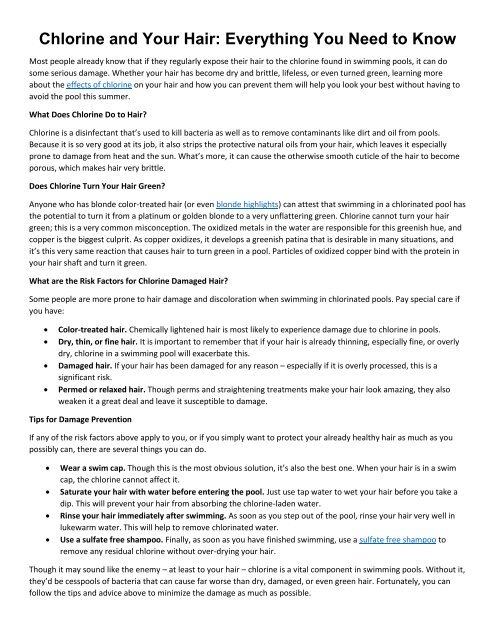Chlorine and Your Hair: Everything You Need to Know
Most people already know that if they regularly expose their hair to the chlorine found in swimming pools, it can do some serious damage. Visit: http://saloninvi.com
Most people already know that if they regularly expose their hair to the chlorine found in swimming pools, it can do some serious damage. Visit: http://saloninvi.com
You also want an ePaper? Increase the reach of your titles
YUMPU automatically turns print PDFs into web optimized ePapers that Google loves.
<strong>Chlorine</strong> <strong>and</strong> <strong><strong>You</strong>r</strong> <strong>Hair</strong>: <strong>Everything</strong> <strong>You</strong> <strong>Need</strong> <strong>to</strong> <strong>Know</strong><br />
Most people already know that if they regularly expose their hair <strong>to</strong> the chlorine found in swimming pools, it can do<br />
some serious damage. Whether your hair has become dry <strong>and</strong> brittle, lifeless, or even turned green, learning more<br />
about the effects of chlorine on your hair <strong>and</strong> how you can prevent them will help you look your best without having <strong>to</strong><br />
avoid the pool this summer.<br />
What Does <strong>Chlorine</strong> Do <strong>to</strong> <strong>Hair</strong>?<br />
<strong>Chlorine</strong> is a disinfectant that’s used <strong>to</strong> kill bacteria as well as <strong>to</strong> remove contaminants like dirt <strong>and</strong> oil from pools.<br />
Because it is so very good at its job, it also strips the protective natural oils from your hair, which leaves it especially<br />
prone <strong>to</strong> damage from heat <strong>and</strong> the sun. What’s more, it can cause the otherwise smooth cuticle of the hair <strong>to</strong> become<br />
porous, which makes hair very brittle.<br />
Does <strong>Chlorine</strong> Turn <strong><strong>You</strong>r</strong> <strong>Hair</strong> Green?<br />
Anyone who has blonde color-treated hair (or even blonde highlights) can attest that swimming in a chlorinated pool has<br />
the potential <strong>to</strong> turn it from a platinum or golden blonde <strong>to</strong> a very unflattering green. <strong>Chlorine</strong> cannot turn your hair<br />
green; this is a very common misconception. The oxidized metals in the water are responsible for this greenish hue, <strong>and</strong><br />
copper is the biggest culprit. As copper oxidizes, it develops a greenish patina that is desirable in many situations, <strong>and</strong><br />
it’s this very same reaction that causes hair <strong>to</strong> turn green in a pool. Particles of oxidized copper bind with the protein in<br />
your hair shaft <strong>and</strong> turn it green.<br />
What are the Risk Fac<strong>to</strong>rs for <strong>Chlorine</strong> Damaged <strong>Hair</strong>?<br />
Some people are more prone <strong>to</strong> hair damage <strong>and</strong> discoloration when swimming in chlorinated pools. Pay special care if<br />
you have:<br />
• Color-treated hair. Chemically lightened hair is most likely <strong>to</strong> experience damage due <strong>to</strong> chlorine in pools.<br />
• Dry, thin, or fine hair. It is important <strong>to</strong> remember that if your hair is already thinning, especially fine, or overly<br />
dry, chlorine in a swimming pool will exacerbate this.<br />
• Damaged hair. If your hair has been damaged for any reason – especially if it is overly processed, this is a<br />
significant risk.<br />
• Permed or relaxed hair. Though perms <strong>and</strong> straightening treatments make your hair look amazing, they also<br />
weaken it a great deal <strong>and</strong> leave it susceptible <strong>to</strong> damage.<br />
Tips for Damage Prevention<br />
If any of the risk fac<strong>to</strong>rs above apply <strong>to</strong> you, or if you simply want <strong>to</strong> protect your already healthy hair as much as you<br />
possibly can, there are several things you can do.<br />
• Wear a swim cap. Though this is the most obvious solution, it’s also the best one. When your hair is in a swim<br />
cap, the chlorine cannot affect it.<br />
• Saturate your hair with water before entering the pool. Just use tap water <strong>to</strong> wet your hair before you take a<br />
dip. This will prevent your hair from absorbing the chlorine-laden water.<br />
• Rinse your hair immediately after swimming. As soon as you step out of the pool, rinse your hair very well in<br />
lukewarm water. This will help <strong>to</strong> remove chlorinated water.<br />
• Use a sulfate free shampoo. Finally, as soon as you have finished swimming, use a sulfate free shampoo <strong>to</strong><br />
remove any residual chlorine without over-drying your hair.<br />
Though it may sound like the enemy – at least <strong>to</strong> your hair – chlorine is a vital component in swimming pools. Without it,<br />
they’d be cesspools of bacteria that can cause far worse than dry, damaged, or even green hair. Fortunately, you can<br />
follow the tips <strong>and</strong> advice above <strong>to</strong> minimize the damage as much as possible.
















